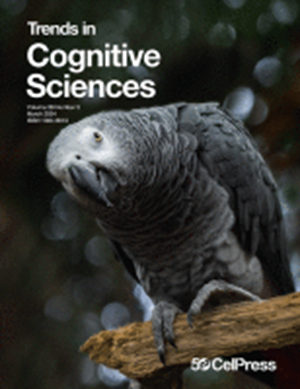童年时期的社会隔离如何导致社会功能障碍:剥夺还是不匹配?
IF 16.7
1区 心理学
Q1 BEHAVIORAL SCIENCES
Trends in Cognitive Sciences
Pub Date : 2024-08-01
Epub Date: 2024-06-04
DOI:10.1016/j.tics.2024.05.005
引用次数: 0
摘要
我们对童年社会隔离如何导致成年社会功能障碍的认识还存在很大差距。为了促进未来的发展机理研究,我们提出了两个概念模型,强调孤立会扰乱与不良经历同时发生(社会剥夺模型)或随后发生(发展错配模型)的发展事件。本文章由计算机程序翻译,如有差异,请以英文原文为准。
How childhood social isolation causes social dysfunction: deprivation or mismatch?
There is a major gap in our understanding of how childhood social isolation causes adult social dysfunction. To stimulate future developmental mechanistic studies, we present two conceptual models which highlight that isolation can disrupt developmental events that are concurrent (social deprivation model) or subsequent (developmental mismatch model) to adverse experience.
求助全文
通过发布文献求助,成功后即可免费获取论文全文。
去求助
来源期刊

Trends in Cognitive Sciences
医学-行为科学
CiteScore
27.90
自引率
1.50%
发文量
156
审稿时长
6-12 weeks
期刊介绍:
Essential reading for those working directly in the cognitive sciences or in related specialist areas, Trends in Cognitive Sciences provides an instant overview of current thinking for scientists, students and teachers who want to keep up with the latest developments in the cognitive sciences. The journal brings together research in psychology, artificial intelligence, linguistics, philosophy, computer science and neuroscience. Trends in Cognitive Sciences provides a platform for the interaction of these disciplines and the evolution of cognitive science as an independent field of study.
 求助内容:
求助内容: 应助结果提醒方式:
应助结果提醒方式:


